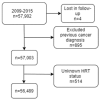Is Breast Cancer Risk Associated with Menopausal Hormone Therapy Modified by Current or Early Adulthood BMI or Age of First Pregnancy?
- PMID: 34072619
- PMCID: PMC8199436
- DOI: 10.3390/cancers13112710
Is Breast Cancer Risk Associated with Menopausal Hormone Therapy Modified by Current or Early Adulthood BMI or Age of First Pregnancy?
Abstract
Menopausal hormone therapy (MHT) has an attenuated effect on breast cancer (BC) risk amongst heavier women, but there are few data on a potential interaction with early adulthood body mass index (at age 20 years) and age of first pregnancy. We studied 56,489 women recruited to the PROCAS (Predicting Risk of Cancer at Screening) study in Manchester UK, 2009-15. Cox regression models estimated the effect of reported MHT use at entry on breast cancer (BC) risk, and potential interactions with a. self-reported current body mass index (BMI), b. BMI aged 20 and c. First pregnancy >30 years or nulliparity compared with first pregnancy <30 years. Analysis was adjusted for age, height, family history, age of menarche and menopause, menopausal status, oophorectomy, ethnicity, self-reported exercise and alcohol. With median follow up of 8 years, 1663 breast cancers occurred. BC risk was elevated amongst current users of combined MHT compared to never users (Hazard ratioHR 1.64, 95% CI 1.32-2.03), risk was higher than for oestrogen only users (HR 1.03, 95% CI 0.79-1.34). Risk of current MHT was attenuated by current BMI (interaction HR 0.80, 95% CI 0.65-0.99) per 5 unit increase in BMI. There was little evidence of an interaction between MHT use, breast cancer risk and early and current BMI or with age of first pregnancy.
Keywords: BMI; age of pregnancy; breast cancer risk; early BMI; menopausal hormone therapy.
Conflict of interest statement
The authors declare no conflict of interest. The funders had no role in the design of the study; in the collection, analyses, or interpretation of data; in the writing of the manuscript, or in the decision to publish the results.
Figures
References
-
- NICE . Familial Breast Cancer: Classification, Care and Managing Breast Cancer and Related Risks in People with a Family History of Breast Cancer. NICE Clinical Guidelines; London, UK: 2013. - PubMed
-
- NICE . Menopause: Diagnosis and Management. NICE Clinical Guidelines; London, UK: 2015.
LinkOut - more resources
Full Text Sources


